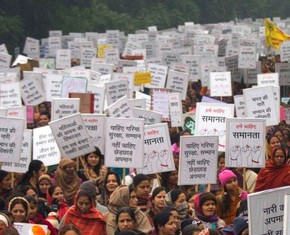The views expressed in our content reflect individual perspectives and do not represent the authoritative views of the Baha'i Faith.
Can individual human beings be truly healthy in an unhealthy society? Why is it important, in the context of our current and rapidly deepening global perplexity, to focus collectively on understanding the nature of social health? Can a shared language of social health across our differences help us take ownership in creating cultures of social health for our children and grandchildren?
Many of our foremost thinkers recognize these important questions, along with the fragmented nature of our current thinking about knowledge and social reality, as the root of the massive problems we now have to resolve. Yet the creative power of how we choose to think about these questions still eludes us. The Baha’i teachings suggest a framework:
The reality of man is his thought, not his material body. The thought force and the animal force are partners. Although man is part of the animal creation, he possesses a power of thought superior to all other created beings. If a man’s thought is constantly aspiring… he becomes saintly; if on the other hand his thought does not soar, but is directed downwards to center itself upon the things of this world, he grows more and more material… – Abdu’l-Baha, Paris Talks, pp. 17-18.
A century of overwhelming focus on our material reality has led to a steep rise in alienation, anxiety, anomie, low self-esteem, depression, relationship distress and breakdown, attention deficit disorders, eating disorders, addictions, and violence.
As early as 1995, the World Mental Health Report offered a comprehensive and authoritative examination of the connection between social context and public health on the level of the individual, the community, and society. Yet, the analysis also made evident the incoherence among different social categories used to address large-scale social phenomena—the lack of an integrated frame of reference for the understanding of and approach to creating social health. Even as recently as 2008, the World Health Organization’s focus on the “social determinants of health” still falls far short of recognizing that human health, at this point in the globalization of our planet, needs to be re-framed as social health.
Meanwhile, since the mid-19th century, a vast body of revealed contemporary social understanding has been released into the world—the Baha’i teachings. These teachings, still largely unknown to much of humanity, synthesize the essence of what earlier religions have taught about the principles of a healthy human social life; and then lay out a new, uniquely coherent roadmap suited to the needs of a global age:
The essential oneness of all the myriad forms and grades of life is one of the fundamental teachings of Baha’u’llah. Our physical health is so linked up with our mental, moral and spiritual health, and also with the individual and social health of our fellowmen, nay, even with the life of the animals and plants, that each of these is affected by the others to a far greater extent than is usually realized. – Dr. J.E. Esselmont, Baha’u’llah and The New Era, pp. 101-102.
Since the Baha’i Faith began, social science has independently corroborated many aspects of this visionary understanding. Documents reflecting a global consensus clearly establish that a shift to a healthy and sustainable global society requires a dialectic of progressive integration of all facets of social life into a morally coherent whole. Despite this understanding, however, social fragmentation persists, making clear the subtle but defining impact of authentic moral motivation which underlies any real movement toward social health. In The Secret of Divine Civilization, originally written in 1875, Abdu’l-Baha examines in-depth the processes of creating genuine social health. Living in a context of extreme religious oppression in 19th century Iran, he wrote:
Any agency whatever, though it be the instrument of mankind’s greatest good, is capable of misuse. Its proper use or abuse depends on the varying degrees of enlightenment, capacity, faith, honesty, devotion and high-mindedness of the leaders of public opinion… – The Secret of Divine Civilization, p. 16.
Be just: can this nominal civilization, unsupported by a genuine civilization of character, bring about the peace and well-being of the people… – Ibid., p. 62.
The honor and distinction of the individual consist in this, that he… should become a source of social good. – Ibid., p. 2.
Until such a collective spiritual motivation becomes preponderant, religion will continue to distort itself into prejudice and violence. Divisions across professional perspectives, and particular political and ethnic commitments, prevent us from collaboratively exploring the path that will ensure the health of our children and grandchildren on an intricately interwoven, interdependent planet.
In an age of easy and hollow promises, we need concrete criteria, as well as discernment, to examine the extent to which a social organization at any level systemically structures itself toward creating social health.
We need to ask ourselves: how morally coherent are the values and principles exhibited in the functioning of a social body? How dialectically are these values held, open to shared examination—or how ideologically are they enforced? How much does a particular social organization uplift the human spirit, inspire nobility of collective action, and encourage rectitude of conduct? How does this social body understand its place in its larger political, social and historical context, or does it view itself as governed primarily by concrete instrumentality? How does a social body balance and integrate masculine and feminine energies, and how does it ensure genuine diversity of perspectives in its consultative governance, while still upholding a universal, principled moral frame of reference?
Once we answer these important questions about our groups and organizations, this unified vision of social health can become our deepest untapped resource, a synergistic energy and shared orientation to creating social value and well-being, released within and among people and groups when they experience collective meaning and moral coherence across the physical, mental, emotional, and spiritual levels of social life. We create social health when a human community organizes itself around the central goal to uplift all.
















Comments
Sign in or create an account
Continue with Googleor